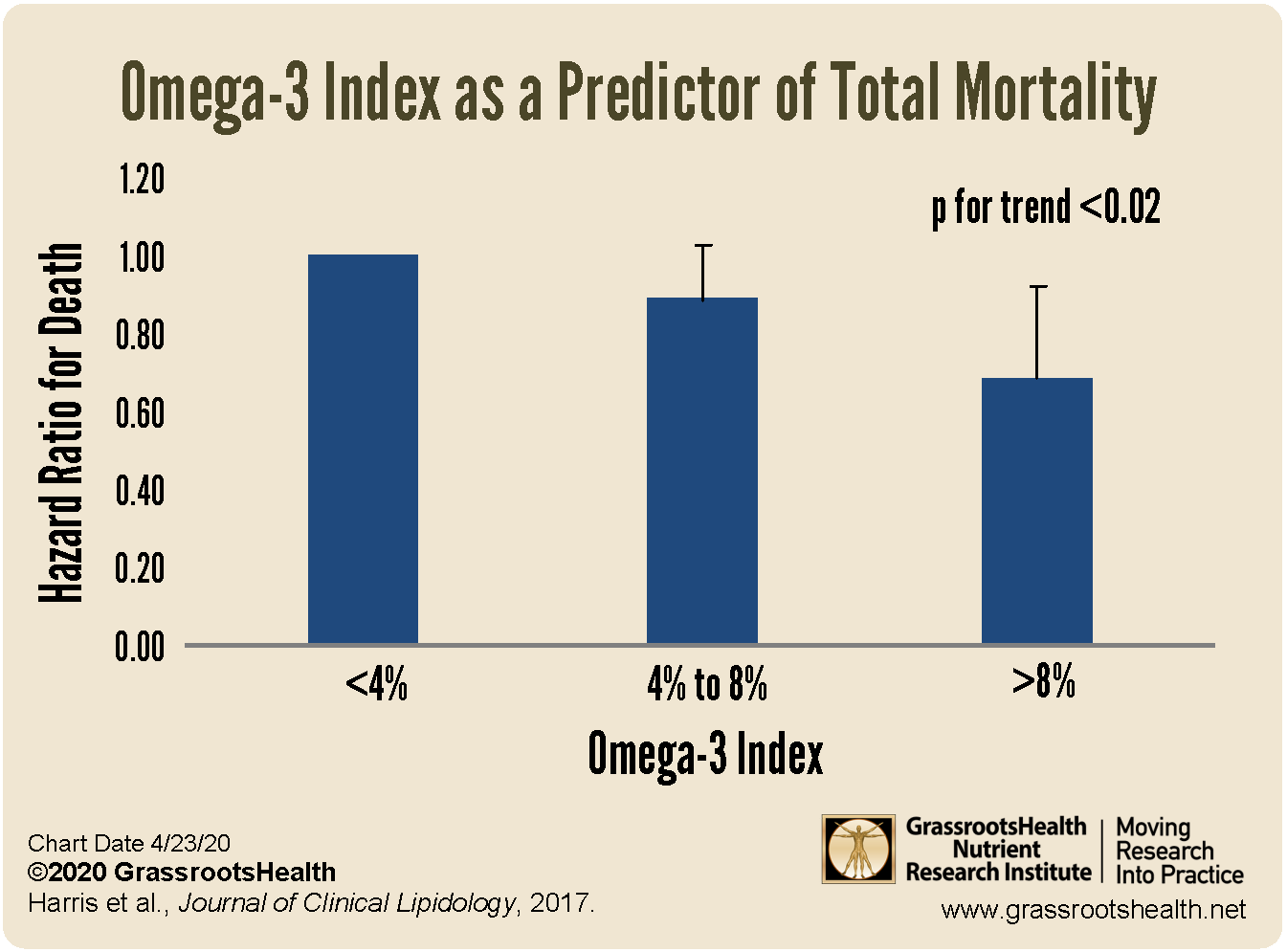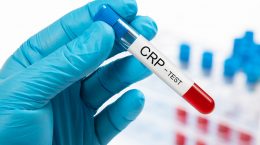Published on July 17, 2020
Omega-3 fatty acids are known to be highly beneficial for health benefits across all ages, from lowering the risk of death from heart disease and breast cancer, to improving mental health and learning disabilities. Findings from the VITAL study, published in 2018, confirmed significant reductions in heart attacks, cardiovascular events, and all-cause mortality among those supplementing with omega-3s.
Omega-3 Index and Mortality
An analysis of the Omega-3 Index and total mortality was conducted by Harris et al. in 2017. The Omega-3 Index was divided into three groups: < 4%, 4-8%, and > 8%, which corresponds to the low, at risk, and optimal levels that are recommended for Omega-3 Index levels.
The median Omega-3 Index was higher in the group of survivors (5.04%) than those who died during the trial (4.92%). This chart summarizes the deaths by Omega-3 Index groups.
Another Study with Similar Findings
Another study by Harris et al., conducted in 2018 with the Framingham Heart Study Offspring Cohort, also found that people with the highest Omega-3 Index levels had a lower risk of overall mortality compared to those with the lowest levels. In addition, higher Omega-3 Index was significantly associated with lower risk in 4 out of 5 health outcomes, including any mortality, while total cholesterol was not associated with risk for any of the outcomes.
This study included 2500 participants in the Framingham Heart Study Offspring Cohort. Participants with a history of cardiovascular disease (CVD) were not included in this study, nor were those with missing measurements for red blood cell fatty acids.
- There were more females (57%) than males (43%) and the average age was 66 years.
- Over the follow up period (median 7.3 years) there were 350 deaths and 245 CVD events.
Results: Cardiovascular events and mortality
 After adjusting for factors including sex, age, BMI, smoking status, and alcohol consumption, there was a significant trend toward lower total CVD, total coronary heart disease (CHD), and total stroke with higher Omega-3 Index.
After adjusting for factors including sex, age, BMI, smoking status, and alcohol consumption, there was a significant trend toward lower total CVD, total coronary heart disease (CHD), and total stroke with higher Omega-3 Index.
The researchers looked at how both Omega-3 Index and total cholesterol were associated with total CVD, total CHD, total stroke, CVD mortality, and any mortality, and found Omega-3 Index to be a better indicator of health. Omega-3 Index was significantly associated with all but CVD mortality, with total mortality 35% lower in those in the highest Omega-3 Index group (>6.8%) compared to the lowest (<4.2%). Total cholesterol was not associated with risk for any of the 5 outcomes.
While the measurement of the omega-3 fatty acids was done only once and changes may have occurred over the follow up period, these findings provide further support for the use of Omega-3 Index screening for health. Check your Omega-3 Index today!
Are You Getting Enough Vitamin D to Help Yourself?
We’re in a time of great crisis that could be greatly affected by making sure you and everyone you know has a serum level of at least 40 ng/ml. Help us help you.
Do you know what your vitamin D level is? Be sure to test today to find out, and take steps to keep it within a target of 40-60 ng/ml or 100-150 nmol/L! Give your immune system the nutrients it needs to support a healthy you and protect yourself from unnecessary diseases.
Through GrassrootsHealth Nutrient Research Institute, you can also test your essential elements magnesium, copper, zinc and selenium, toxins such as lead, mercury and cadmium, as well as your omega-3 levels, inflammation levels and thyroid stimulating hormone (TSH) level. Find out your levels today! Log on to the test selection page (click the link below) to get your tests and see for yourself if your levels can be improved.
Make sure you track your results before and after, about every 6 months!
How can I track my nutrient intake and levels over time?
To help you track your supplement use and nutrient levels, GrassrootsHealth has created the Personal Health Nutrient Decision System called
For each specific supplement, you can track what days you take it, how much, and many other details. This will help you know your true supplemental intake and what patterns of use work for you to reach and maintain optimum nutrient levels. Check it out today!








